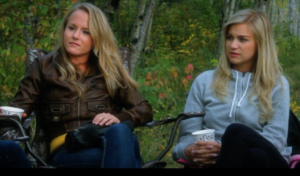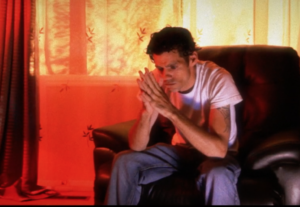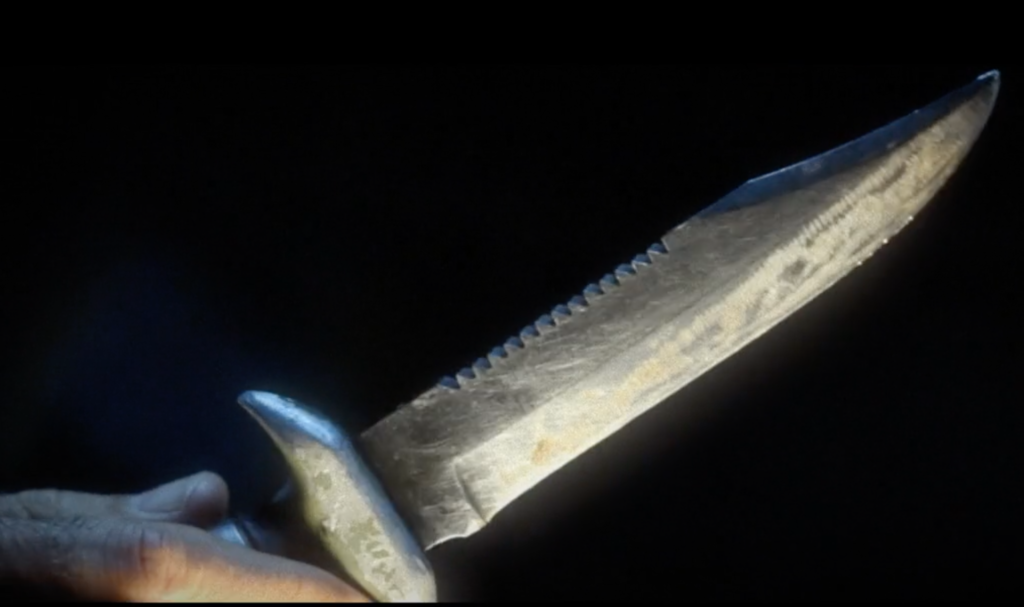Independent horror is a hard genre to master – slasher films harder still. Frequently with little in the way of budget, their creators often find their hands severely tied. But filmmakers can surprise us. For instance, I watched the horror film “Everto,” by Director Antoine McKnight, graded it a ‘C,’ calling it “a clear love of the slasher genre” and “a valiant effort.”
Sitting down to review the Canadian horror film “Dark Forest,” I regretfully cannot say the same. It has the pieces…such as a creepy woodland setting, a one-by-one pick ‘em off motif, and even tries its hand at creative death sequences. It’s low-budget, and has some acting and production missteps…but they’re forgivable. However its biggest affront is the script, which abandons the standard ‘innocent weekend away’ design, instead using domestic violence as fodder for entertainment – a hard transgression to overlook.
As horror films go, the plot is simple. A young woman named Emily (Laurel McArthur) decides to defy her abusive boyfriend Peter (Dennis Scullard) and go on a camping trip with her friends. Peter discovers this, becomes enraged, and decides to go after her. His friends Roy and Jake (Matthew Stefanson, Trevor Kristjanson), seeming frat boy types, only want to scare Emily and her friends. But Peter has other ideas. Brandishing a menacing looking knife he states his plan to “gut those bitches.” One friend objects; one does not. But neither calls the police to report their friend, bending the film’s suspension of disbelief a little too far in the process.
You can tell Director/Writer Roger Boyer’s clear love of the genre, as he takes steps to work some easter eggs into the production, such as the killer’s house number being ‘1428’ – after the “A Nightmare on Elm Street Series” – as well as sexually charged twenty-something types carousing in the forest. There’s even some additional campers apart from the main cast added as cannon fodder. But it’s all for not. With weak acting, stilted dialogue, and an ill-suited plot mechanism, viewing “Dark Forest” feels more like work than entertainment.

The character development is problematic. Something that answers for backstory is offered between two sisters, Michelle and Francine (Veronica Ternopolski, Jalin Desloges), but the rest of the cast – including its’ heroine Emily – are painted extremely thin, if not completely empty. The girls show camaraderie, teasing each other about their lack of romance, frolicking in the lake with bikinis, and cursing a lot; but never once, ever, touching upon Emily’s increasingly dangerous relationship.
The guys in the film are even worse. The aforementioned Roy and Jake, as well as the film’s random male campers, are reduced to mere caricatures of actual people. With the exception of one camper Franky (Jesse Laing), they’re also incredibly misogynistic and sophomoric. I can’t count the number of references I noted to “doing it,” bro-type slaps on the back, or instances where one or the other referred to his love interest as a “bitch.” It’s very evident that “Dark Forest” was written by and for men with a sophomoric sense of humor.
The film’s acting is a problem, but it’s more the fault of its shallow script than the actual performers. Most of the time, “Dark Forest” just doesn’t sound like the way actual people would talk to one another. The only exception is Desloges, who is able to take whatever comes her way and make it sound natural, dynamic, and seamless. With five acting credits to her name, I’d be excited to see what she can do with deeper material.
 If you like gore, you may get a rise out of “Dark Forest,” as it is plentiful, but not overabundant or crass. The body count is high, and the deaths are creative and brutal. But the effect is all wrong. Murders in slasher films like this are presented and accepted as entertainment. They work because we don’t have any stock in the villain. Jason Vorhees…Michael Myers…Chucky – they are blank slates with a name. They’re plot mechanisms and nothing more.
If you like gore, you may get a rise out of “Dark Forest,” as it is plentiful, but not overabundant or crass. The body count is high, and the deaths are creative and brutal. But the effect is all wrong. Murders in slasher films like this are presented and accepted as entertainment. They work because we don’t have any stock in the villain. Jason Vorhees…Michael Myers…Chucky – they are blank slates with a name. They’re plot mechanisms and nothing more.
However this doesn’t work with this film, as its’ villain is just plain vile. He’s a hate-filled young man who humiliates and intimidates Emily, calls her friend a “slut” and a “bitch,” and decides to go on a killing spree when she has the audacity to leave without his permission. His killing spree is strewn with rage, malice, and, inappropriately, humor. This makes “Dark Forest” all the more confusing, as it desperately wants to be “Friday the 13th,” but seems to overlook the obvious: domestic violence is not funny or entertaining – and not something that should be normalized for a plot device in a skin-deep slasher.
“Dark Forest” has other missteps as well, such as a soundtrack that is anxious in all the wrong places, and little in the way of camerawork to build suspense. Boyer and company are trying, but unfortunately it just doesn’t work. If you love the ‘80s, or devour the slasher horror genre, “Dark Forest” will give you just what you expect. But critically I just can’t recommend it.


